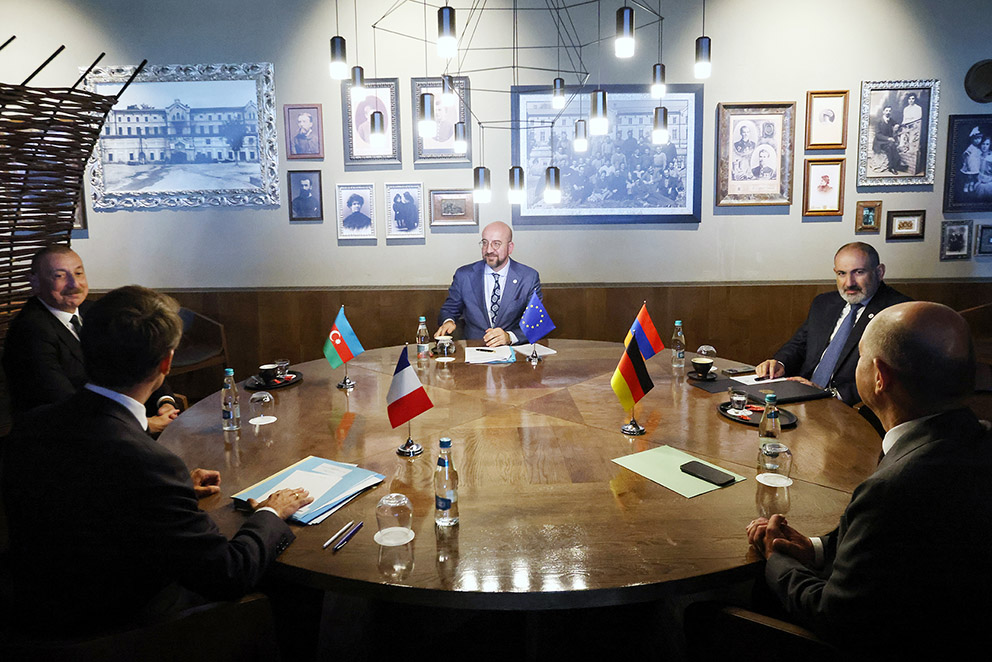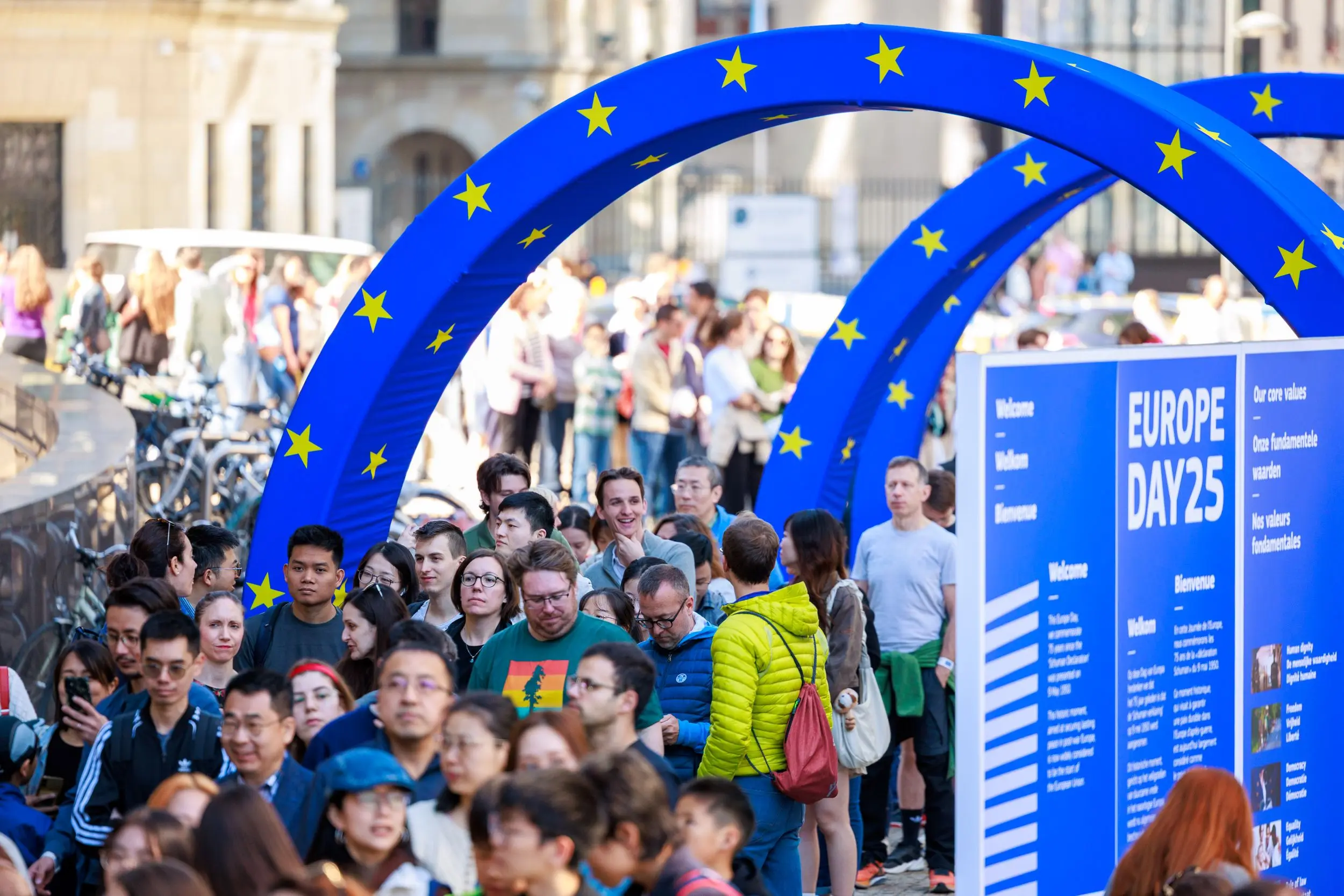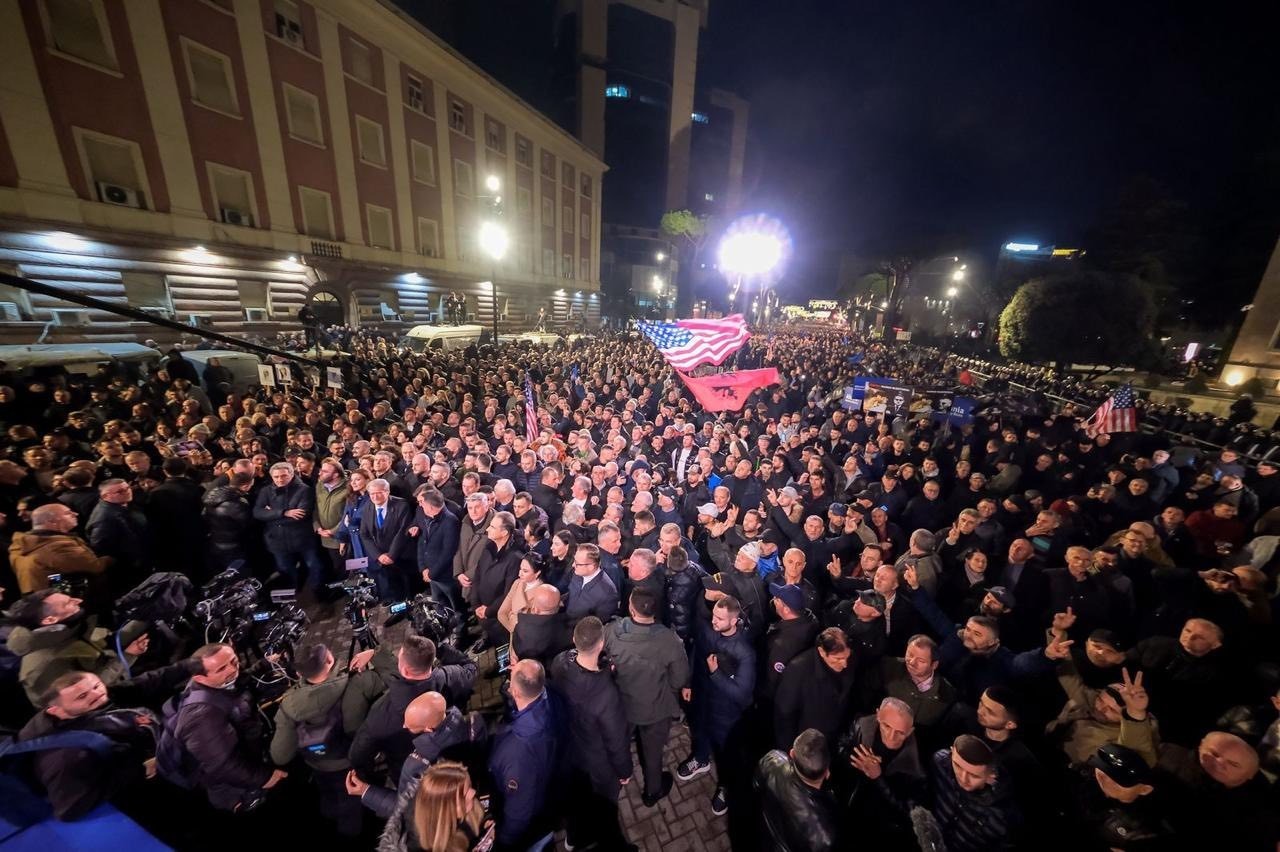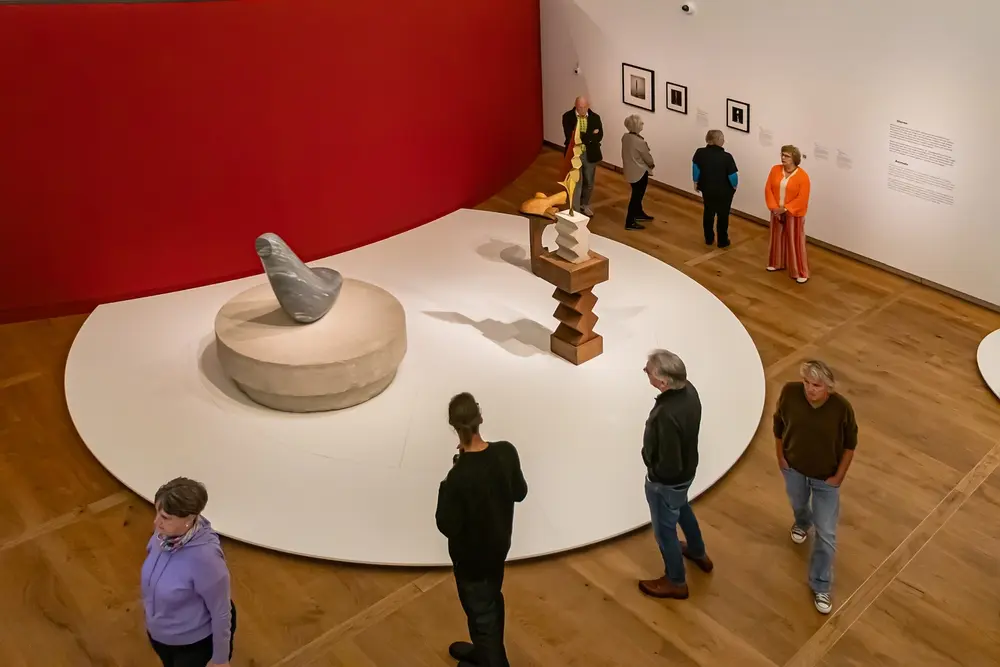Armenia and Azerbaijan, new talks in Moscow, Chişinău, and Ankara
A tight series of talks and meetings attended by Nikol Pashinyan, prime minister of Armenia and Ilham Aliyev, president of Azerbaijan, took place in various locations, from Moscow to Chişinău and even in Ankara. The goal was to seek the normalisation of relations between Yerevan and Baku

Armenia-and-Azerbaijan-new-talks-in-Moscow-Chisinau-and-Ankara
From left to right: Ilham ALIYEV (President of the Republic of Azerbaijan), Emmanuel MACRON (President of France), Charles MICHEL (President of the European Council), Nikol PASHINYAN (Prime Minister of the Republic of Armenia), Olaf SCHOLZ (Federal Chancellor, Germany) © European Union
Following last month’s meeting in Brussels between Armenian Prime Minister Nikol Pashinyan and Azerbaijan President Ilham Aliyev hosted by European Council President Charles Michel, talks between Yerevan and Baku continue to intensify. Not to be outdone by the flurry of activity from the United States and the European Union, Russian President Putin also hosted the two leaders at the sidelines of the Supreme Eurasian Economic Council meeting in Moscow on 25 May.
Although Azerbaijan is not a member of the Eurasian Economic Union, Aliyev attended as a guest, something that Armenia had always vetoed before. The event had also been preceded by another meeting of the trilateral working group on unblocking regional transport routes in the region following the 2020 Karabakh war as led by the deputy Prime Ministers of Armenia, Azerbaijan, and Russia. The actual trilateral between Aliyev, Pashinyan, and Putin, however, lasted just 20 minutes.
Putin did nonetheless say that the differences between Baku and Yerevan were “purely technical” and “surmountable,” in apparent reference to what had appeared to be an impasse on the reconstruction of rail links between Azerbaijan and its exclave of Nakhchivan through Armenia. Indeed, the next meeting of the trilateral working group was announced for Friday 2 June. Following that meeting it was announced that the sides had finally reached a “general agreement”.
Even so, arguments on terminologies still persist, with Pashinyan objecting directly to Aliyev’s use of the term “Zangezur Corridor” during the Supreme Eurasian Economic Council meeting. Aliyev responded by saying that the term does not amount to a territorial claim on Armenian soil. Instead, some argue, the only extra-territorial implication in the unblocking of regional transportation lies in the 2020 ceasefire statement itself which foresees Russian control over it.
Border and customs control, it is believed, would be implemented in full accordance to the legislation of both countries and on the basis of reciprocity.
A significant underpinning of any future agreement to normalise relations between Armenia and Azerbaijan, another key issue remains the status of the former Nagorno Karabakh Autonomous Oblast (NKAO). Yerevan has virtually recognised the territory as part of Azerbaijan and on 24 May Pashinyan once again reaffirmed this by echoing the words of Charles Michel’s at last month’s meeting in Brussels. Azerbaijan comprised 86,600 square kilometres, including Karabakh.
Senior U.S. officials such as USAID Assistant Administrator Erin Elizabeth McKee and Deputy Assistant Secretary of State Dereck Hogan were quick to welcome Pashinyan’s words. The matter for discussion now is how best to guarantee the rights and security of Karabakh’s Armenians within Azerbaijan. U.S. State Department spokesperson Matthew Miller also expressed ‘appreciation’ for an offer to amnesty Karabakh’s de facto officials if they resigned from their positions.
Naturally, the opposition in Armenia as well as the de facto authorities in Stepanakert criticised both statements of support. The Armenian Foreign Ministry also raised concerns on the offer of amnesty made by Aliyev delivered on 28 May in the town of Lachin, back under Azerbaijani control last year, as it was also accompanied by what Yerevan considered to be threats.
Nonetheless, Aliyev and Pashinyan met again on 1 June on the sidelines of the second European Political Community Summit in Chişinău, Moldova. The meeting was also attended, as was the case at the EPC in Prague last year, by European Council President Charles Michel and French President Emmanuel Macron, but also German Chancellor Olaf Scholz.
Though lasting only an hour and a half, the informal meeting touched upon the restoration of transport links, the delimitation of the Armenia-Azerbaijan border, and the right and security of Karabakh’s ethnic Armenian population.
Speaking to representatives of Moldova’s ethnic Armenian community afterwards, Pashinyan described the talks as ‘useful’, adding little more than confirming that Soviet-era maps from 1975 would be used as the basis for delimiting the border. For his part, Michel said that the next meeting of the Armenian and Azerbaijani leaders would be on 21 July.
However, on 5 June Armenian Foreign Minister Ararat Mirzoyan said that the issue of which map to use had not been agreed yet.
In a surprise move on 3 June, Armenian Prime Minister Nikol Pashinyan visited Ankara to attend the inauguration of Turkish President Recep Tayyip Erdoğan. The Armenian leader is the first to visit Turkiye since October 2009, when then Armenian President Serzh Sargsyan visited Bursa in an official capacity. Pashinyan, however, is the first leader to attend such a high-profile event in decades.
At the reception following the inauguration ceremony, photographs of Aliyev and Pashinyan talking amicably and informally filled social media. Erdoğan also posed for photographs with Pashinyan and senior representatives of Turkiye’s ethnic Armenian community. Aliyev was also shown speaking to – and laughing with – Istanbul’s Armenian Patriarch Sahak Mashalyan.
Meanwhile, following their 1-4 May talks in Arlington, Virginia, the Armenian and Azerbaijani Foreign Ministers are due to meet again in Washington D.C.. It is believed this could be on 12 June.
Armenia and Azerbaijan, new talks in Moscow, Chişinău, and Ankara
A tight series of talks and meetings attended by Nikol Pashinyan, prime minister of Armenia and Ilham Aliyev, president of Azerbaijan, took place in various locations, from Moscow to Chişinău and even in Ankara. The goal was to seek the normalisation of relations between Yerevan and Baku

Armenia-and-Azerbaijan-new-talks-in-Moscow-Chisinau-and-Ankara
From left to right: Ilham ALIYEV (President of the Republic of Azerbaijan), Emmanuel MACRON (President of France), Charles MICHEL (President of the European Council), Nikol PASHINYAN (Prime Minister of the Republic of Armenia), Olaf SCHOLZ (Federal Chancellor, Germany) © European Union
Following last month’s meeting in Brussels between Armenian Prime Minister Nikol Pashinyan and Azerbaijan President Ilham Aliyev hosted by European Council President Charles Michel, talks between Yerevan and Baku continue to intensify. Not to be outdone by the flurry of activity from the United States and the European Union, Russian President Putin also hosted the two leaders at the sidelines of the Supreme Eurasian Economic Council meeting in Moscow on 25 May.
Although Azerbaijan is not a member of the Eurasian Economic Union, Aliyev attended as a guest, something that Armenia had always vetoed before. The event had also been preceded by another meeting of the trilateral working group on unblocking regional transport routes in the region following the 2020 Karabakh war as led by the deputy Prime Ministers of Armenia, Azerbaijan, and Russia. The actual trilateral between Aliyev, Pashinyan, and Putin, however, lasted just 20 minutes.
Putin did nonetheless say that the differences between Baku and Yerevan were “purely technical” and “surmountable,” in apparent reference to what had appeared to be an impasse on the reconstruction of rail links between Azerbaijan and its exclave of Nakhchivan through Armenia. Indeed, the next meeting of the trilateral working group was announced for Friday 2 June. Following that meeting it was announced that the sides had finally reached a “general agreement”.
Even so, arguments on terminologies still persist, with Pashinyan objecting directly to Aliyev’s use of the term “Zangezur Corridor” during the Supreme Eurasian Economic Council meeting. Aliyev responded by saying that the term does not amount to a territorial claim on Armenian soil. Instead, some argue, the only extra-territorial implication in the unblocking of regional transportation lies in the 2020 ceasefire statement itself which foresees Russian control over it.
Border and customs control, it is believed, would be implemented in full accordance to the legislation of both countries and on the basis of reciprocity.
A significant underpinning of any future agreement to normalise relations between Armenia and Azerbaijan, another key issue remains the status of the former Nagorno Karabakh Autonomous Oblast (NKAO). Yerevan has virtually recognised the territory as part of Azerbaijan and on 24 May Pashinyan once again reaffirmed this by echoing the words of Charles Michel’s at last month’s meeting in Brussels. Azerbaijan comprised 86,600 square kilometres, including Karabakh.
Senior U.S. officials such as USAID Assistant Administrator Erin Elizabeth McKee and Deputy Assistant Secretary of State Dereck Hogan were quick to welcome Pashinyan’s words. The matter for discussion now is how best to guarantee the rights and security of Karabakh’s Armenians within Azerbaijan. U.S. State Department spokesperson Matthew Miller also expressed ‘appreciation’ for an offer to amnesty Karabakh’s de facto officials if they resigned from their positions.
Naturally, the opposition in Armenia as well as the de facto authorities in Stepanakert criticised both statements of support. The Armenian Foreign Ministry also raised concerns on the offer of amnesty made by Aliyev delivered on 28 May in the town of Lachin, back under Azerbaijani control last year, as it was also accompanied by what Yerevan considered to be threats.
Nonetheless, Aliyev and Pashinyan met again on 1 June on the sidelines of the second European Political Community Summit in Chişinău, Moldova. The meeting was also attended, as was the case at the EPC in Prague last year, by European Council President Charles Michel and French President Emmanuel Macron, but also German Chancellor Olaf Scholz.
Though lasting only an hour and a half, the informal meeting touched upon the restoration of transport links, the delimitation of the Armenia-Azerbaijan border, and the right and security of Karabakh’s ethnic Armenian population.
Speaking to representatives of Moldova’s ethnic Armenian community afterwards, Pashinyan described the talks as ‘useful’, adding little more than confirming that Soviet-era maps from 1975 would be used as the basis for delimiting the border. For his part, Michel said that the next meeting of the Armenian and Azerbaijani leaders would be on 21 July.
However, on 5 June Armenian Foreign Minister Ararat Mirzoyan said that the issue of which map to use had not been agreed yet.
In a surprise move on 3 June, Armenian Prime Minister Nikol Pashinyan visited Ankara to attend the inauguration of Turkish President Recep Tayyip Erdoğan. The Armenian leader is the first to visit Turkiye since October 2009, when then Armenian President Serzh Sargsyan visited Bursa in an official capacity. Pashinyan, however, is the first leader to attend such a high-profile event in decades.
At the reception following the inauguration ceremony, photographs of Aliyev and Pashinyan talking amicably and informally filled social media. Erdoğan also posed for photographs with Pashinyan and senior representatives of Turkiye’s ethnic Armenian community. Aliyev was also shown speaking to – and laughing with – Istanbul’s Armenian Patriarch Sahak Mashalyan.
Meanwhile, following their 1-4 May talks in Arlington, Virginia, the Armenian and Azerbaijani Foreign Ministers are due to meet again in Washington D.C.. It is believed this could be on 12 June.









